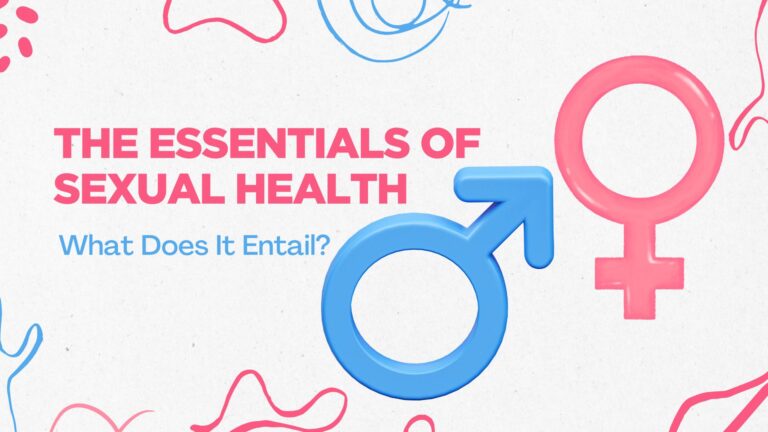Sexual health is a crucial component of overall well-being that encompasses physical, emotional, mental, and social aspects related to sexuality. It goes beyond the absence of disease; it involves a positive and respectful approach to sexuality and sexual relationships. Understanding the essentials of sexual health is vital for making informed choices, fostering healthy relationships, and promoting overall well-being. Let’s explore what sexual health entails and why it matters.

What Is Sexual Health?
Definition of Sexual Health
Sexual health is defined by the World Health Organization (WHO) as a state of physical, emotional, mental, and social well-being in relation to sexuality. It involves the ability to have pleasurable and safe sexual experiences, free from coercion, discrimination, and violence. Sexual health is influenced by various factors, including cultural, social, and individual contexts.
Key Components of Sexual Health
- Understanding Anatomy and Physiology: Knowledge of one’s body and sexual organs is essential for making informed decisions about sexual health.
- Safe Sexual Practices: This includes the use of protection against sexually transmitted infections (STIs) and unintended pregnancies.
- Consent and Communication: Open and honest communication about desires, boundaries, and consent is vital for healthy sexual relationships.
- Access to Healthcare: Regular health check-ups, STI screenings, and access to contraceptive options contribute to sexual health.
Why Sexual Health Matters
Impact on Overall Well-Being
Sexual health significantly impacts physical, emotional, and mental well-being. Positive sexual experiences can enhance intimacy, promote healthy relationships, and boost self-esteem. Conversely, poor sexual health can lead to physical complications, emotional distress, and strained relationships.
Prevention of Health Issues
Promoting sexual health can help prevent a range of health issues, including:
- Sexually Transmitted Infections (STIs): Regular screenings and safe practices can reduce the risk of STIs.
- Unintended Pregnancies: Understanding contraceptive options and using them effectively can help individuals plan their families.
- Mental Health Challenges: Addressing issues related to sexual health can prevent emotional distress, anxiety, and depression.
Empowerment and Education
A comprehensive understanding of sexual health empowers individuals to make informed choices. Education about sexual health promotes healthy attitudes and behaviors, reduces stigma, and encourages open discussions about sexuality.

Key Aspects of Sexual Health
1. Safe Sex Practices
Practicing safe sex is essential for reducing the risk of STIs and unintended pregnancies. Key practices include:
- Using Condoms: Condoms are effective barriers that help prevent the transmission of STIs and unwanted pregnancies.
- Regular STI Testing: Regular testing for STIs is crucial for maintaining sexual health, especially for sexually active individuals.
- Open Communication: Discussing sexual history and health status with partners promotes transparency and safety.
2. Understanding Consent
Consent is a fundamental aspect of sexual health. It involves clear, mutual agreement to engage in sexual activity, ensuring that all parties feel comfortable and respected. Key points about consent include:
- Enthusiastic Agreement: Consent should be enthusiastic and given freely, without pressure or coercion.
- Ongoing Process: Consent is not a one-time agreement; it must be obtained continuously throughout any sexual encounter.
- Respecting Boundaries: Individuals have the right to change their minds about consent at any time.
3. Access to Healthcare
Access to sexual health services is vital for maintaining overall health. Key services include:
- Regular Check-Ups: Routine health screenings and check-ups help detect any potential issues early.
- Contraceptive Options: Understanding and accessing different contraceptive methods can help individuals plan their families and prevent unintended pregnancies.
- Education and Resources: Access to educational resources about sexual health can empower individuals to make informed decisions.
4. Emotional and Mental Well-Being
Sexual health is closely tied to emotional and mental well-being. Healthy sexual relationships contribute to self-esteem, intimacy, and overall happiness. To promote emotional well-being:
- Communicate Openly: Foster open communication with partners about desires, boundaries, and feelings.
- Seek Support: If facing challenges related to sexual health or relationships, consider seeking professional help from counselors or therapists.
5. Healthy Relationships
Building and maintaining healthy relationships is essential for sexual health. Key aspects include:
- Mutual Respect: Healthy relationships are built on respect, trust, and equality.
- Understanding Dynamics: Recognize and address any power imbalances or unhealthy dynamics within relationships.
- Support and Care: Healthy relationships involve mutual support, understanding, and care for each other’s well-being.
Conclusion
Sexual health is an essential aspect of overall well-being that encompasses physical, emotional, mental, and social dimensions. Understanding the essentials of sexual health—safe sex practices, consent, access to healthcare, emotional well-being, and healthy relationships—can empower individuals to make informed choices and foster healthier, more fulfilling lives. Prioritizing sexual health not only benefits individuals but also contributes to the overall health of communities and society.
FAQs
Why is consent important in sexual health?
Consent is crucial because it ensures that all parties involved in sexual activity feel comfortable and respected, promoting healthy and safe interactions.
How can I practice safe sex?
Practicing safe sex involves using condoms, getting regular STI testing, and communicating openly with partners about sexual health.
What services are included in sexual health care?
Sexual health care services include routine check-ups, STI screenings, contraceptive options, and access to educational resources about sexual health.
How does sexual health impact mental well-being?
Positive sexual health contributes to emotional well-being, enhances self-esteem, and fosters healthy relationships, while poor sexual health can lead to anxiety and emotional distress.


